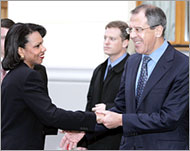Iran official calls Russia talks ‘positive’
The top Iranian official, leading his country at talks with Russia on the latter’s offer to enrich uranium for Iran, has described the outcome of the two-day meeting as positive.

“I assess our negotiations as positive. There are elements in these negotiations which give us grounds for hope that we will reach an agreement,” the Interfax news agency quoted Ali Hosseinitash, the deputy secretary of the Supreme National Security Council, as saying before he left Moscow on Tuesday.
“We discussed a joint formula and we will continue talks,” Hosseinitash told Iranian television by telephone from Moscow.
Sergei Kiriyenko, head of Russia‘s atomic energy agency Rosatom, is to travel to Iran on Thursday. Asked at a news briefing if the talks would continue, he said: “Definitely.”
Iran’s Hosseinitash did not elaborate. He said that the talks had covered a wider range of issues than the Russian proposal, focusing on the 6 March meeting of the UN nuclear watchdog, the International Atomic Energy Agency (IAEA).
The Russian offer is widely seen as a final opportunity for Iran to address the West’s concerns about its suspected nuclear weapons programme before the IAEA session that could start a process leading to possible UN sanctions.
Moscow’s plan
Under Moscow‘s plan, Iran‘s enrichment activities would take place on Russian soil to ensure no uranium is diverted for nuclear weapons.
Enrichment is a process that involves feeding uranium gas through cascades of centrifuges. When purified to low levels, the result is reactor fuel, but the process can be extended to make the fissile core of a nuclear bomb.
 |
|
Russia’s Sergei Lavrov(R) said he |
Iran has also announced it will not limit nuclear talks to the EU-3 of Britain, France and Germany, saying it attached greater weight to negotiations with Moscow.
Manouchehr Mottaki, the Iranian foreign minister, vowed on Tuesday Iran would not go back on its resumption of small-scale uranium enrichment which has infuriated Western countries and led to Tehran facing the threat of UN Security Council action.
“Our contacts with the European Union will for the moment not be held only with the EU-3, but also in a unilateral manner with the different countries of the European Union,” Mottaki said after talks on Monday with EU officials in Brussels.
Goodwill gesture
Iran had frozen uranium conversion and enrichment activities as a goodwill gesture during talks with the EU-3 but the already tortuous egotiations collapsed when it resumed conversion and then small-scale enrichment.
While attaching little weight to negotiations with the European Union, Mottaki said Iran was putting the most emphasis on its discussions with Russia over Moscow’s proposal.
“At the current time the European Union has said it is ready to accept an eventual agreement between Iran and Russia,” he said.
 |
|
Mottaki (R) said Iran would no |
“This means that if there is a need to have official discussions with the European Union it will be to complete the Russian proposal.”
However, Mottaki made clear that there was no chance of Iran going back on its resumption of small-scale uranium enrichment at home for research purposes.
“At the moment we are at the beginning of the road for enrichment in the laboratory. Any new idea for negotiations need to go from this point,” he said.
Frank-Walter Steinmeier, the German foreign minister, said on a visit to Japan that diplomacy can still work in resolving the Iranian nuclear standoff even though economic sanctions cannot be ruled out.
“The issue of a military option does not arise,” Steinmeier told a news conference. “We must show imagination and take advantage of different diplomatic possibilities.”